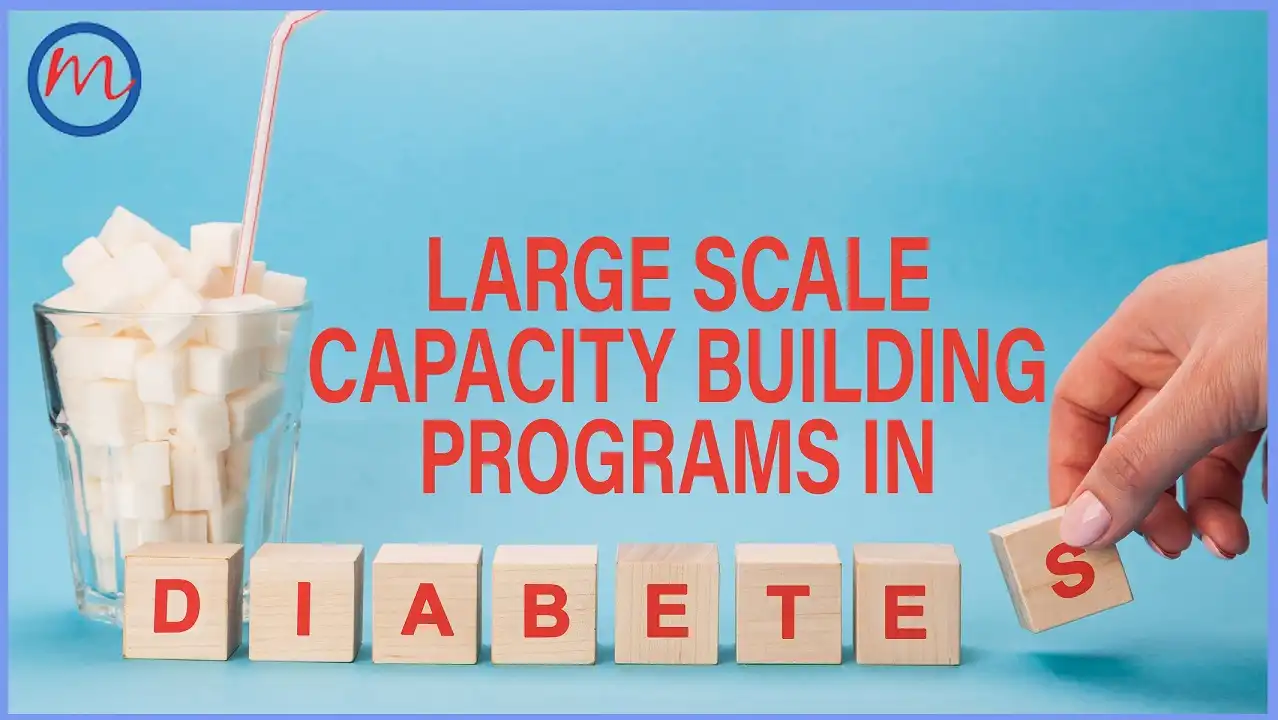DR. SANDEEP BHALLA,
DIRECTOR, TRAINING – PHFI,
PUBLIC HEALTH FOUNDATION OF INDIA (PHFI),
NEW DELHI
&
DR. V. MOHAN,
PRINCIPAL,
DR. MOHAN’S DIABETES EDUCATION ACADEMY (DMDEA),
CHENNAI
During the last 10 years, Dr.Mohan’s Diabetes Education Academy (DMDEA) has been collaborating with the Public Health Foundation of India (PHFI) to conduct various certificate courses related to diabetes in order to improve the diabetes care in the country. In this article, we talk about 3 such courses; 1) The Certificate Course in Evidence Based Diabetes Management (CCEBDM), 2) Certificate Course in Gestational Diabetes Mellitus (CCGDM) and 3) Certificate Course in Evidence Based Management in Diabetic Retinopathy (CCDR). The details of these courses are given in the rest of the article.
Course I : Certificate Course in Evidence Based Diabetes Management (CCEBDM)
The Certificate Course in Evidence Based Diabetes Management (CCEBDM) is a joint certificate program developed and implemented by Public Health Foundation of India (PHFI) and is one of the flagships courses of PHFI and one of its more popular ones. CCEBDM was developed in collaboration with PHFI’s academic partner, Dr Mohan’s Diabetes Education Academy (DMDEA) with an unrestricted educational fund support by MSD Pharmaceuticals Pvt. Ltd, India. DMDEA has provided robust and updated curriculum along with valuable inputs from a broad-based panel of National Experts and experienced Faculty who are the backbone of this course. The fundamental objective of the course is to enhance knowledge, skills and core competencies of primary care physicians (PCPs) in the management of diabetes and to build a network of PCPs and specialists in the field of diabetes.
CCEBDM is one of the largest capacity building training programs in India for PCPs in the field of diabetes management which is running successfully for more than a decade. This is the first ever course which had received recognition from International Diabetes Federation (IDF) for 2014-16 for excellence in providing education to healthcare professionals. Recognizing the credibility and quality of the course, the South Asian Federation of Endocrine Societies (SAFES) has also provided recognition to this course for a period of 3 years from 2017 to 2019.
During its 10 years journey, CCEBDM has built a network of 17 nationally and internationally acclaimed endocrinologists or diabetologists as National Experts, 296 renowned Faculty and 13,363 doctors from 466 districts of India and this network is increasing day by day.
The course has also bagged many awards and accolades which include BMJ Award India, 2014 as finalist for Excellence in Medical Education, PHD annual Award for Excellence in Skill Development 2015, ASSOCHAM Commendation Certificate for Best NGO-Skill Development 2016-17, FICCI Health Care Excellence Award 2017-18, DL Shah Platinum Award for Quality by QCI 2018-19, Best NGO/Education Award in CII’s National Excellence Practice Competition 2018, and Health- Skilling Brand 2018(Gold Category Award).
It has been expanded to Myanmar, Nepal, Ministry of Health, Government of Rwanda, Bangladesh , Afghanistan and East Africa Diabetes Study Group which constitutes five east African countries i.e. Rwanda, Uganda, Tanzania, Burundi and Kenya.
The CCEBDM model has also been published in Lancet Diabetes and Endocrinology under the title of “Innovation in capacity building of primary-care physicians in diabetes management in India: a new slant in medical education”, Volume 4, Issue 3, 200 – 202, 2016.
Seeing the success and credibility of this course, various State Governments including those of Kerala (under National Rural Health Mission), Madhya Pradesh, Mizoram, Haryana, Odisha and Manipur (under the National Health Mission) as well as the Kolkata Municipal Corporation and Reliance Industries Limited have adopted the CCEBDM training for their medical officers of respective states in the field of diabetes management. We are also optimistic that engagement with government sector will increase in near future as talks are in pipeline with many more States governments for adoption of this model.
The Sixth Cycle of the CCEBDM program was launched recently all across the country with the enrollment of 2422* Primary Care Physicians (PCPs) from 296 districts. There are 137 centres in 73 cities across 22 states and UTs in this cycle. The current cycle is supported by a panel of 16 national experts, 162 regional faculty and 89 observers.
Course II : Certificate Course in Gestational Diabetes Mellitus (CCGDM)
Diabetes is one of the major medical disorders complicating pregnancy affects one in five births worldwide. It is associated with several risks to the unborn child, which can be prevented by early detection and appropriate treatment of maternal hyperglycemia. Gestational diabetes mellitus (GDM), defined as glucose intolerance with onset or first recognition during pregnancy, is also associated with increased risk of type 2 diabetes in the future for the mother. The International Diabetes Federation (IDF) estimated that, worldwide, 20.9 million women suffered from some form of hyperglycemia during pregnancy in 2019. In India, it has been estimated that nearly 4 million women had GDM in 2019. Providing screening and care to mothers at risk is therefore likely to have multigenerational impact in improving outcomes.
Unfortunately, missed and delayed diagnosis of GDM is common, particularly in low‑ and middle‑income countries (LMICs) like India. The frequently cited reasons are lack of awareness among patients and health‑care providers, paucity of facilities, and shortage of medical staff. The multiplicity of screening and diagnostic guidelines also adds to the confusion. Lack of knowledge and awareness among physicians in a specialised area such as gestational diabetes, adds to the rising burden of diabetes in India and worldwide. Addressing this issue by educating primary care physicians is an essential first step towards improving GDM management. Improving awareness of GDM and its management among health‑care professionals is, therefore, imperative to reduce morbidity.
In 2013, the Public Health Foundation of India (PHFI), Delhi in partnership with Dr. Mohan’s Diabetes Education Academy (DMDEA), Chennai, launched a National Capacity Building Programme, titled Certificate Course in Gestational Diabetes Mellitus (CCGDM), targeting Primary Care Providers (PCPs) across the country along with key stakeholders. CCGDM was developed as a four module course to train primary care physicians for the future. This was a joint program of PHFI and DMDEA with strong course curriculum, vetted and approved by an eminent panel of national experts comprising eminent endocrinologists and gynaecologists.
The contact based 4 modular program is spread across 4 months which follows standardized protocols and guidelines and is delivered by case studies, lectures and interactive one-to-one session by proficient and trained faculty. Each training centre has one Diabetologist/ Endocrinologist and one Gynaecologist/ Obstetrician. The quality of the course is evaluated and assured through robust monitoring & evaluation mechanism. The pre- requisite qualification for course enrolment is MBBS with minimum 3 years’ experience as a practising physician or Postgraduate degree in any field which was in line with the core standards set by the program. Timely assignment and assessment review was done to evaluate the participants’ understanding of the subject. The educational material provided is resource sensitive and up-to-the-minute.
The main objective is the enhancement of knowledge, skills, and core competencies of all doctors who are involved in the diagnosis and management of GDM and to build a network to update these doctors with the latest advancements in the field. This contact training program is conducted on a weekend once in a month for 4 consecutive months.
Since its inception in 2013, CCGDM has trained more than 3600 PCPs and covered 49 cities and 257 districts in 26 states & 3 UTs in the last six cycles spanning a period of seven years. Currently, 152 participants are being trained under CCGDM Cycle VI. Huge participation by postgraduate physicians (52%) is a testament to the necessity and requirement of such capacity building initiatives. Training is delivered to small groups (trainer‑to‑participant ratio 2:15 approx.) through didactic lectures. Finally, an organic referral linkage is established, creating a potential network for implementation of research.
The program involves 15 National Experts and 147 trained Regional Faculty and is monitored by 25 observers. The CCGDM model has also been adopted by five state governments- National Health Mission (NHM) of Madhya Pradesh (MP), Gujarat , Meghalaya, Tripura and Uttarakhand for training of their medical officers. It has been adopted by Ministry of Health Rwanda, and Kabul University of Health Sciences, Afghanistan.
CCGDM has been recognized by the International Diabetes Federation (IDF) for a duration of 2 years (2015–2016), and South Asian Federation of Endocrine Societies (SAFES) for a duration of 6 years (2014–2019).This model was also selected for presentation at “Third National Summit on best practices and innovations in public health care systems in India” organized by MoHFW, Government of India, in August 2016, at Tirupathi, Andhra Pradesh and was published as a coffee table book by NHSRC on good, replicable and innovative practices – “Winds of Change”. The CCGDM model has also been published as a paper in the Indian Journal of Endocrinology and Metabolism, Volume 21, Issue 6, Nov-Dec, 2017.
CCGDM is a well-structured educational training model to build capacity among doctors in Management of GDM. This progressive training model has the potential to be adopted by LMICs and other government bodies and also spread into a variety of healthcare arenas.
Course III : Certificate Course in Evidence Based Management of Diabetic Retinopathy (CCDR)
In India, 72 million people are suffering from diabetes. Studies showed that every fifth person in India with diabetes could have Diabetic Retinopathy (DR) causing a significant impact on health system. The spiralling burden of diabetes and the associated visual impairment, and shortage of specialists in the periphery necessitates the training of Primary Care Physicians (PCPs) to combat the increasing DR burden in India. With early management, it is possible to reduce the risk of blindness from DR by 90%. To address this burden, a capacity-building model of Certificate Course in Evidence Based Management of Diabetic Retinopathy (CCDR) was initiated with an objective to build the skills and core competencies of PCPs for evidence-based management of DR.
In 2015, the Public Health Foundation of India (PHFI) in collaboration with academic partners, Dr Mohan’s Diabetes Education Academy (DMDEA), Chennai, India, the Aravind Eye Care System, Madurai, India launched a national capacity building programme, titled “Certificate Course in Evidence Based Management of Diabetic Retinopathy (CCDR).” The initial educational grant was provided by The Queen Elizabeth Diamond Jubilee Trust (QEDJT), with additional supplemental funding from the Leona M. and Harry B. Helmsley Charitable Trust through the London School of Hygiene & Tropical Medicine (LSHTM).
The fundamental objective of CCDR was to enhance knowledge, skills, and core competencies of PCPs to prevent and manage DR and to build their network with other PCPs and specialists. The four modular course was conducted as once-a-month contact session, with hands-on-skill training and an exit examination. The curriculum covered various aspects of DR with the aim of strengthening PCPs capacity of screening, referral, and management of diabetes and risk factors for complications.
The complete and comprehensive learning package includes printed modules along with pen drive developed by the academic partners, DMDEA and Aravind Eye Care System and vetted by a panel of eight national experts (diabetologists and retina specialists) and delivered by Diabetologists & Retina Specialists working together. The eligibility criterion for PCPs to enroll was a graduate medical degree (MBBS) with clinical experience of more than 3 years. The course was delivered by 42 regional faculties in 20 centers across 13 states and 1 union territory of India. Quality assurance of the program ensured by necessary documentation, peer-reviews and by establishing alignment between module objectives, lectures material, case discussions, assignments, assessments and continuous monitoring. Robust pedagogy and mentorship is an integral component of this program.
The program has completed four cycles and 578 physicians have been trained from 114 districts in India till date. Seven state governments nominated one-third of the government-affiliated participants from various health facilities [district hospitals, community health centers, primary health centers (PHCs), others]. To assess change in participant’s knowledge, a module-based pre/post-test was administered before the start and end of each session which observed an average increase of 1 unit score (on a scale of 10). During the final evaluation, the participants rated the course modules and teaching methodology with an overall score of 9/10 (excellent).
The CCDR program won several awards and accolades, receiving endorsement from reputed bodies that include UK Research and Innovation, Global Challenges Research Fund through Ornate-India and has been endorsed for 3 years (2019–2022) by the All India Ophthalmological Society (AIOS). CCDR model published in Indian Journal of Ophthalmology, Volume 68, Supplement 1, Jan 2020
The course received an excellent response, which reflects the felt need for skill improvement in DR management for physicians in India. Participant’s feedback revealed that after CCDR certification, some of the primary care physicians have already included fundus photography as a part of their investigation armamentarium for patients with DM and are referring to ophthalmologist as necessary. The Evaluation shows 92% participants agreed that the case studies, videos, activities and hands-on-training provided were adequate for initiating discussions for replicating real life case scenarios in DR management. More than 95% of the participants agreed that the training facilitated them to do the early detection and better management of the patients with eye complications. This model demonstrated an innovative modality to address DR-related avoidable blindness in a resource-constrained country like India.
In the Government’s universal health coverage strategy, a major thrust has been given to PHCs, which requires an effort to upskill doctors at a primary level. CCDR course has been adopted by the Government of Madhya Pradesh, India for training of 100 medical officers under National Health Mission (NHM). Beyond India, the course has been adopted by the Ministry of Health in Rwanda, Afghanistan, and Myanmar. These offshore tie-ups are further demonstration of the importance and significance of CCDR in the management of DM and DR in countries with similar economy and resources as India.
To ensure sustainability and expand the reach, the CCDR course has now been developed and implemented into an E-learning model in collaboration with Robert Bosch Engineering and Business Solutions Private Limited (RBEI). Around 100 participants will complete the E-learning program in 2020.
CCDR is a continued effort to align the program as a sustainable training model and designed to be adaptive to the needs of the PCPs, so that its access and impact reaches the far-off areas. The PCPs (including postgraduates) in India have an unmet need for education on the management of DR and the course implements a system that is responsive to the specific needs of the stakeholders.
Hyperlinks about the courses
- https://www.ccebdm.org/ccebdm.php
- https://www.ccgdm.org/
- http://www.ccdr.org.in/
- http://diabetescourses.in/
Articles published about the courses in Medical Journal
- Bhalla S, Unnikrishnan R, Srivastava R, Tandon N, Mohan V. Innovation in capacity building of primary-care physicians in diabetes management in India: a new slant in medical education. Lancet Diabetes Endocrinology. 2016;1-2. Availabel at https://www.thelancet.com/pdfs/journals/landia/PIIS2213-8587(15)00514-8.pdf
- Unnikrishnan R, Jaganathan S, Wadhwani P, Bhalla S, Kumar P, Sinha S, Bhatla N, Venkatram P, Ghosh K, Mittal A, Prabhakaran D, Tandon N, Mohan V,Ram U. Gestational diabetes mellitus training: A well-grounded approach for safeguarding two generations. Indian Journal of Endocrinology and Metabolism. 2017;21:934-5. Available at http://www.ijem.in/article.asp?issn=2230-8210;year=2017;volume=21;issue=6;spage=934;epage=935;aulast=Unnikrishnan
- Bhalla S, Soni T, Joshi M, Sharma VK, Mishra R, Mohan V,Unnikrishnan R, Kim R, Murthy GVS, Prabhakaran D, Rani PK, Rajalakshmi R. A partnership model for capacity-building of primary care physicians in evidence-based management of diabetic retinopathy in India. Indian Journal of Ophthalmology. 2020 Feb;68(Supplement):S67-S69. Available at http://www.ijo.in/article.asp?issn=0301-4738;year=2020;volume=68;issue=13;spage=67;epage=69;aulast=Bhalla



